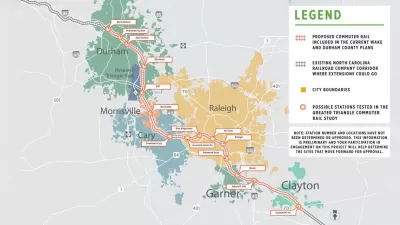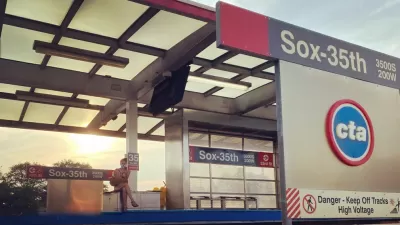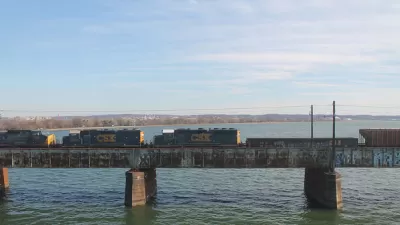As commuter patterns shift, so too do the transit funding preferences of the federal government.

A plan for a commuter rail system connecting the cities of Raleigh, Durham, and Cary in North Carolina, also known as the Triangle, won’t get the funding it needs from the federal government. According to recent reports, the rejection of the plan has everything to do with shifting commute patterns after the Covid-19 pandemic.
“Representatives of the Federal Transit Administration told a group of Triangle leaders that the COVID-19 pandemic has changed how people use transit and that trains that serve morning and evening commuters to central business districts have become outdated,” reports Richard Stradling.
The FTA also told local officials that they would support bus rapid transit (BRT) investments instead. Sig Hutchinson, who heads the board of GoTriangle, the agency leading the commuter rail planning, is paraphrased in the article saying that the FTA will pay for half of qualifying BRT lines.
Construction is already underway on the region’s first BRT route, with plans for more. “The Wake Transit Plan approved by voters in 2016 calls for building four BRT lines radiating out from downtown Raleigh,” reports Stradling. “Construction on the first line along New Bern Avenue east to a park-and-ride lot on New Hope Road is expected to begin by the end of the year, said Het Patel, the city’s transit planning supervisor.”
The Triangle started planning the commuter rail system in 2020, shortly after Duke University helped scuttle a $3.3 billion, 17-mile light rail transit plan in early 2019. The commuter rail plan would have spanned 43 miles and cost $3.2 billion, with stops at 15 stations, according to a “Commuter Rail Feasibility Report” published by Go Triangle in January 2023.
Additional news coverage of the FTA’s rejection of funding for the Triangle’s commuter rail plans is available from Axios Raleigh. “We were told the FTA is no longer funding commuter rail,” Raleigh Mayor Mary-Ann Baldwin told Axios.
FULL STORY: Feds to Triangle: Don’t expect any federal money to build your commuter rail line

Planetizen Federal Action Tracker
A weekly monitor of how Trump’s orders and actions are impacting planners and planning in America.

Maui's Vacation Rental Debate Turns Ugly
Verbal attacks, misinformation campaigns and fistfights plague a high-stakes debate to convert thousands of vacation rentals into long-term housing.

San Francisco Suspends Traffic Calming Amidst Record Deaths
Citing “a challenging fiscal landscape,” the city will cease the program on the heels of 42 traffic deaths, including 24 pedestrians.

Defunct Pittsburgh Power Plant to Become Residential Tower
A decommissioned steam heat plant will be redeveloped into almost 100 affordable housing units.

Trump Prompts Restructuring of Transportation Research Board in “Unprecedented Overreach”
The TRB has eliminated more than half of its committees including those focused on climate, equity, and cities.

Amtrak Rolls Out New Orleans to Alabama “Mardi Gras” Train
The new service will operate morning and evening departures between Mobile and New Orleans.
Urban Design for Planners 1: Software Tools
This six-course series explores essential urban design concepts using open source software and equips planners with the tools they need to participate fully in the urban design process.
Planning for Universal Design
Learn the tools for implementing Universal Design in planning regulations.
Heyer Gruel & Associates PA
JM Goldson LLC
Custer County Colorado
City of Camden Redevelopment Agency
City of Astoria
Transportation Research & Education Center (TREC) at Portland State University
Jefferson Parish Government
Camden Redevelopment Agency
City of Claremont





























